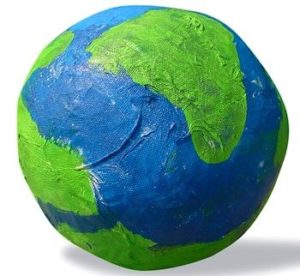Facebook Post by Rabbi Perlin in the Time of Coronavirus (4/22/2020)
Wednesday Post 4.22.20: EARTH DAY 2020
by Rabbi Amy R. Perlin, D.D.
When one of my boys was in first grade, his class was dealing with early signs of bigotry. My son was being picked on for being Jewish and not celebrating Christmas, and other children were being treated differently for having different skin color or ethnicity. The class was not diverse in our little Virginia suburb, so difference stood out. Thankfully, much has changed in thirty years.
The teacher asked if I would come in to talk with the class, cautioning me that I was not allowed to mention God or religion. I stayed up late into the night to think about what I might say to convince the children that they were, in reality, all the same. I arrived at school with an aluminum foil, homemade headgear and multi-colored chalk. I drew the earth on the blackboard – blue and green in a circle, very recognizable by first graders. And then I began my lesson:
I told the children to imagine that we were all aliens from another planet looking down at the earth. As an educator, I knew this would create a communal mindset of “sameness,” even as I was to be discussing difference. And then I invited them to come in my spaceship to look down at this planet we were passing. I asked them to tell me about this green and blue planet. What came out, of course, was that the planet had beings called “humans” on it. And those humans shared the planet with animals, birds, and fish. And there were trees and mountains. The humans breathed air, and needed sun and rain for their food to grow. As a group of aliens, we didn’t see the differences in religion, or skin color, or country. I never mentioned the differences, as the children automatically all focused on what these beings shared. All these carbon-based life forms (of course I threw in a Star Trek reference!) were “earthlings.”
When I took off my aluminum foil hat, and looked at the class, I asked them to look around the room. What do you see? One little girl jumped up and said, “Earthlings!” And then, in my most secular sermonic way, I brought my message home. We are all the same: we breathe; we eat; we go to the bathroom; we share the planet Earth. If we were all exactly the same, like robots, it would be really boring. So, each of us brings something special to the Earth. Each one of us has talents and differences that help us to be unique, even though we are all the same. AND each one of us has the responsibility to take care of the earth and all the earthlings.
The students got the 15-minute lesson and I went home with my aluminum foil hat.
We live in a world where too many leaders focus on division and difference. We live in a world where selfishness and greed prevail over doing what is right and just. We live in a world with food insecurity, inadequate health care, pollution, and profit-driven decisions. We live in a world that is too often encouraged to think locally and not globally for solutions to problems, and stupidly thinks that putting up walls and isolation will solve the problems we all face.
On this Earth Day 2020, I would love to gather all the adults of our world into a global classroom. I would teach them that we are all “earthlings.” For the sake of the future of our children and our planet, it is time to stop thinking about today, and start thinking about tomorrow. We can’t solve the problems of our planet by promoting greatness. We can only solve the problem of climate change and the devastation of our world, when we recognize that we are all in this together. From the most vulnerable to the most protected humans, to the most vulnerable and most protected land, water, and air, it is time to start putting EARTHLINGS and EARTH first.
Everything you need to know about Earth Day, you could learn in first grade. Sadly, too many of our fellow earthlings haven’t left Kindergarten.

